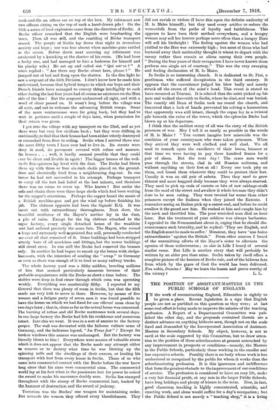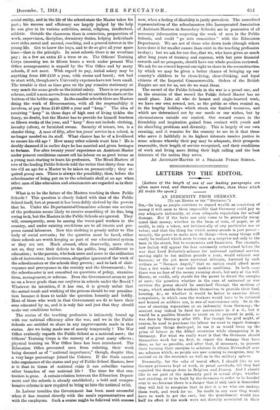THE POSITION OF ASSISTANT-MASTERS IN THE PUBLIC SCHOOLS OF ENGLAND.
IN the work of reconstructing England, Education is rightly to be given a place. Recent legislation is a sign that English people are not as purblind on this question as they were ; at last some real effort-is being made to improve the salaries of the teaching profession. A Report of a Departmental Committee was pub- lished the other day, and the proposals contained therein are a distinct ad-vane on anything hitherto seen, though not on the scale fixed and demanded by the Incorporated Association of Assistant- Masters in Secondary Schools. My object, however, is not to cavil at the scale suggested by this Committee, but to draw atten- tion to the position of those schoolmasters at present untouched by any improvement in prospects or conditions—namely, the Masters in the Public Schools, particularly those working in the smaller and less expensive schools. Possibly there is no body whose work is less understood or recognized by the public for whom it works than the schoolmastering profession. It is this ignorance and indifference that form the greatest obstacle to the improvement of our conditions of service. The profession is considered to have an easy life, make a very fair financial profit, at any rate in the larger Public Schools, have long holidays and plenty of leisure in the term. Now, in fact, good classroom teaching is highly concentrated, scientific, and exacting work, and alone would suffice for a day's occupation ; but the Public School is not merely a " teaching shop," it is a living --social entity, and in the life of the school-state the Master takes his part ; his. success and efficiency are largely judged by the help he can give in its various activities, social, religious, intellectual, . athletic. Outside the classroom there is correction, preparation of work, supervision, discipline, dormitory duties, helping individuals over stiles moral and mental, coaching, and a generalinterest in the young life. Get to. know.the boys, and to do so give all your spare time—that is .the. principle. In most schools- there is no overtime pay ; in. a few an extra £5 a term or so. The Officers' Training Corps (meaning ten to fifteen hours a week under present War Office arrangements) is unpaid by the War Office • and by many schools, -if not most. With regard to pay, initial salary may be :anything from £80-£150 a year, with rooms and board ; not bad to start with, though one's University expenses have not been smalL The trouble is that as time goes on the pay remains stationary at very much the same grade as the initial salary. There is no pension scheme, and if a man moves from one school to an.other hestarts at the bottom of the ladder again. In the smaller schools there are Masters doing the, work of Housemasters, with all the responsibility it involves, at pay from £140-£200 a year and " keep." The idea of receiving " keep " in. these days of high cost of living tiokles the fancy,- no doubt, but-the Master has to provide for himself fourteen or fifteen weeks of the'year, and " keep " does not include clothing, laundry (often), or furnished. rooms. Security of tenure, too, is a slender thing. A man of fifty, after ten years' service in a school, is no longer needed on its staff. What chance has he of a livelihood to ensure his old age ? How many other schools want him ? He is doubly damnedif is earlier days he has married and given hostages to fortune. For after twenty years' experience an Assistant-Master under present conditions cannot sell his labour on as good terms as a young man starting to learn his profession. The Head-Masters of two of the leading Public Schools told the writer that thirty-four was too old an age for a Master to be taken on permanently ; they re- quired you men. There is always the pogaihility, then, before the schoolmaster of being put on to the scholastic shelf at an age when other. men of like education and attainments are rejarded as in their prime.
What is to be the future of the Masters teaching in these Public Schools ? This question is closely linked with that of the Public School itself, but at present it has been deftly shelved by the powers that be. Under the. Departmeb.tal Committee scheme one section of the profession seems likely to receive something of its due, long owing to it, but the Masters in the Public Schools are ignored. They will, consequently,. soon be among the worst-paid workers in the country, and under existing conditions are to all intents and pur- poses casual labourers. Now this shelving is grossly unfair to this body of social servants ; for the question must be faced, either these schools are worth keeping as part of our educational system or they are not. Much abused, often deservedly, more often not so, they owe their defects to the public, long indifferent to education ; to the parents, who look more and more to the utilitarian aide of instruction; to Governors, altogether ignorant of the work of the schoolmasters or the- schools they govern ; and to lack of clair- voyance and prevoyance in the country and the Government ; for the schoolmaster is not consulted on questions of policy, examina- tions, _management, or reforms. Does the Government mean to put us on a lower grade than our confreres in schools under the Board ? Whatever its intention, if it has one, it is grossly unfair that theaotual result and (working of the process should. be our penaliza- tion because it fears to tackle the question honestly and boldly. Most of, those who work in that Government see fit to have their sons educated by us, and it is only fair and just that they should make our conditions better.
The status of the teaching profession is intimately bound up with our national efficiency after the war, and we in the Public Schools .are. entitled to share in any improvements made in that status. Are we being made use of merely temporarily ? The War Office evidently regards the Public School as &national asset; the Officers' Training Corps is the nursery of a great many officers ; physical training on War Office lines has been introduced. The Education Office prevented men from enlisting, their work being deemed .as of ".national importance," though, despite this, a very large percentage joined the Colours. If the State cannot take cognizance of the status and pay of Public School Masters, how is it that in times of national crisis it can subsidize various other branches of our national life ? The time for that con- tention is gone. A certain relation between the Education Depart- ment and the schools is already established ; a bold and compre- hensive scheme is now required to bring us into the national orbit.
.In Labour troubles the Government has been most successful when it has . treated directly with the men's representatives and with the employers. Such a course might be followed with success
now, when a feeling of disability is justly prevalent. The accredited representatives of the schoolmasters (the Incorporated Association of Assistant-Masters in Secondary Schools) are in possession of all necessary information respecting the work of men in the Public Schools, and could "go into committee" with the Education Department. We are not of those who down tools (though others have done it for smaller causes than exist in the teaching profession to-day) ; but we ask for our due, that we, who have given so much after long years of training and expense, with but poor financial rewards and no prospects, should have our whole position reviewed. We ask for no reward beyond our right to share in the reconstruction by which we may be given a better chance of bringing up our country's children to be clean-living, clear-thinking, and loyal citizens of the Imperial Commonwealth. Orders of the British .Empire are not for us, nor do we want them.
The record of the Public Schools in the war is a proud one, and in the oreation of that record the Public School Master has no small place. Like all who do honest and single-hearted work, we have our own reward, not, as the public so often remind us, in the lengthy holidays which strain our limited resources, and which are determined not by our needs or our wishes, but by circumstances outside our control. Our reward comes in the friendship and inspiration gained from contact with youth and its absorbing problems and diversity. This is largely of our own creating, and it remains for the country to see to it that those who serve it faithfully in its highest interests receive justice in some scheme whereby •their pay may be adequate, their prospects reasonable, their length of service recognized, and their conditions of work and living • more fitting their high calling and the best interests of the nation they serve.
AN ASSISTANT-MASTER IN a SMALLER PUBLIC SCHOOL.











































 Previous page
Previous page